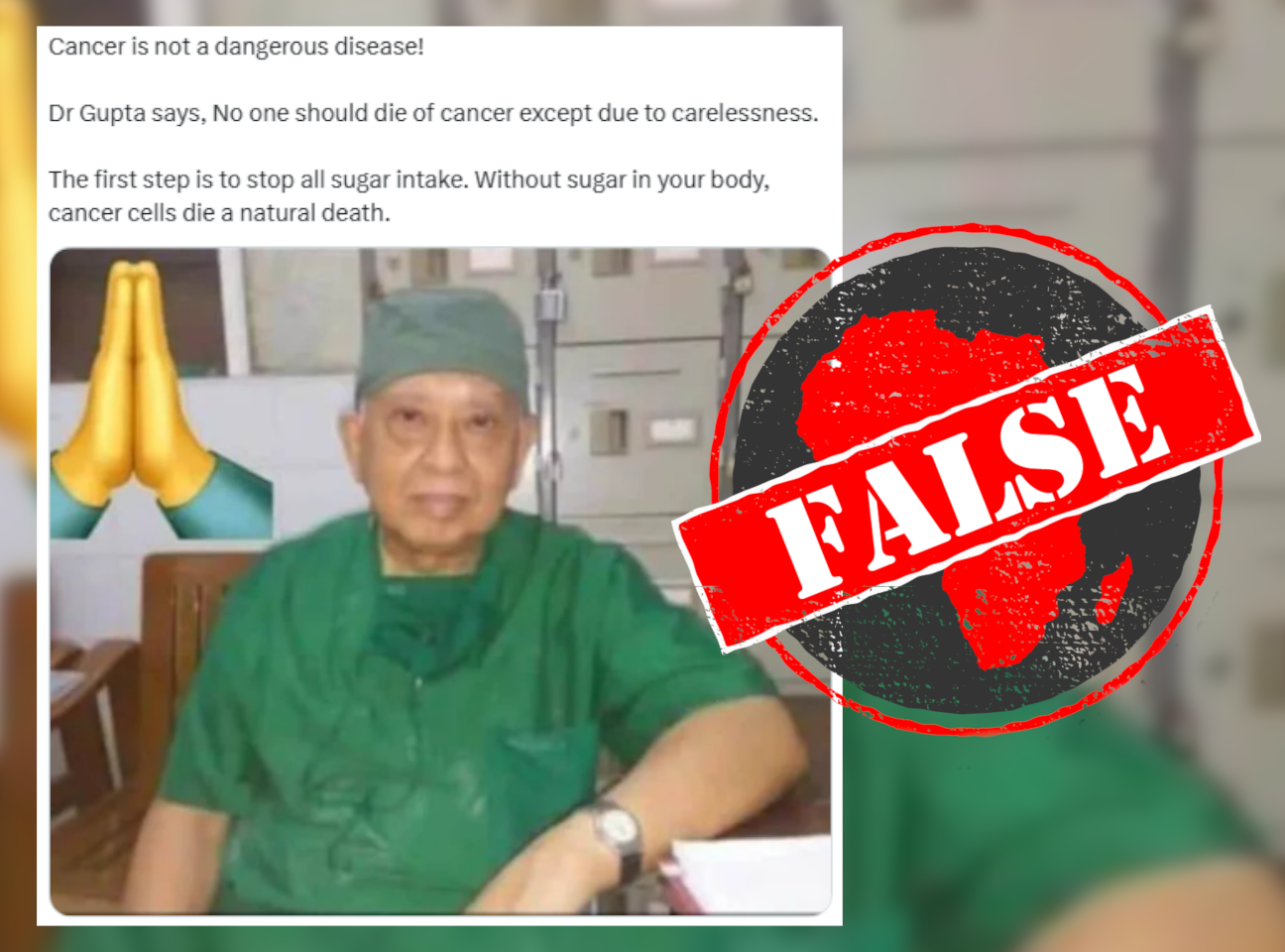IN SHORT: Claims that you can naturally cure cancer with sugar restriction, hot lemon water or coconut oil are false. Look out for the red flags of zombie claims like these and follow our tips for spotting and avoiding them.
A social media post with over 11,000 views has been doing the rounds in South Africa, claiming that the first step to curing cancer is to “stop all sugar intake”, attributing the advice to a “Dr Gupta”.
The post reads: “Cancer is not a dangerous disease! Dr Gupta says, No one should die of cancer except due to carelessness. The first step is to stop all sugar intake. Without sugar in your body, cancer cells die a natural death.”
The same claim has been posted on Twitter (now called X) here, here and here. The claim has also made its way to Facebook.
Other versions of the claim are longer and advise the use of hot lemon water or coconut oil.
“Mix the lemon fruit juice with a cup of hot water and drink it for 1-3 months first thing in the morning, before food and cancer will be gone,” these posts claim.
The posts add that readers can also “drink 3 tablespoons of organic coconut oil, morning and night and cancer will disappear”.
“You can choose any of the two other treatments including avoiding sugar.”
But these claims aren’t true. Here’s why you should beware of these false cancer cures from “Dr Gupta” on social media.

Not eating sugar will not kill cancer cells
In a 2019 fact-check, Africa Check could find no trace of any doctor behind the claims posted on social media. A quick Google search for the keywords “Dr Gupta”, “sugar” and “cancer” still only brings up more examples of the claim. There is no evidence this doctor is real.
But what about the claim that not consuming sugar will kill cancer cells?
The World Health Organization says that consuming sugar is a risk factor for obesity. This could lead to an increased risk factor for several noncommunicable diseases, including cancer. But this is only when eaten in excess, beyond the normal daily consumption rate.
The cells in our bodies are fuelled by glucose, the main type of sugar in the blood. Cancer is a disease of the cells and Cancer Research UK says that the claim that cancer can be treated by restricting sugar comes from the idea that if you starve the cancer in the cells of glucose, they’ll die.
But the body’s healthy cells also need glucose. And cancer cells also need other nutrients, such as amino acids and fats.
The Memorial Sloan Kettering Cancer Center, a cancer treatment and research institution in the US, says that the average person should rather eat a balanced diet that avoids too many carbohydrates – or complex sugars – and keep their weight within a healthy range.
Restricting sugar intake will not treat or cure cancer. Common treatment options for cancer patients include surgery, chemotherapy, radiation therapy and immunotherapy.
Hot lemon water and coconut oil will not make cancer ‘disappear’
The social media posts claim that hot lemon water or three tablespoons of organic coconut oil can make cancer disappear. These claims are also false.
Africa Check previously found that there is no evidence that a hot lemon water mixture can cure cancer.
An expert warned us that this has not been scientifically proven and should not be recommended as a treatment for the disease.
Other experts also warned us that there have not been any human trials for the use of coconut oil in cancer treatment.
Moreover, coconut oil is very high in saturated fat, which can be unhealthy if ingested in excess.
Tips for spotting and avoiding viral zombie claims
We call viral claims that pop up every few years zombie claims. These claims refuse to die despite having been debunked before.
In our guide to zombie claims, we provide a few tips for spotting and avoiding these recycled hoaxes:
- If the claim hasn’t been reported by a major news outlet, it's a red flag that it’s not true, especially when it comes to “miracle cures”.
- Be wary of information shared on social media without evidence, especially if it has been liked or reposted many times.
- Watch out for claims that seem too good or shocking to be true, like natural remedies, because they usually aren’t.
- Always visit many credible news organisations or fact-checking websites to sort fact from fiction.
Republish our content for free
For publishers: what to do if your post is rated false
A fact-checker has rated your Facebook or Instagram post as “false”, “altered”, “partly false” or “missing context”. This could have serious consequences. What do you do?
Click on our guide for the steps you should follow.
Publishers guideAfrica Check teams up with Facebook
Africa Check is a partner in Meta's third-party fact-checking programme to help stop the spread of false information on social media.
The content we rate as “false” will be downgraded on Facebook and Instagram. This means fewer people will see it.
You can also help identify false information on Facebook. This guide explains how.


Add new comment